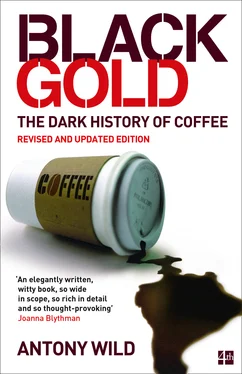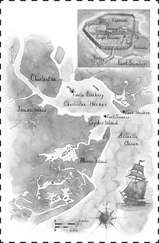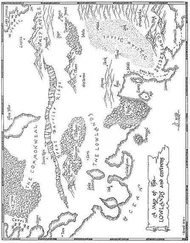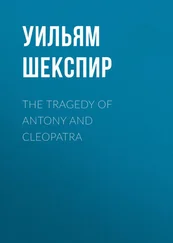
4th Estate
An imprint of HarperCollins Publishers
1 London Bridge Street
London SE1 9GF
www.4thEstate.co.uk
This eBook first published by 4th Estate in 2019
First published as Coffee: A Dark History by 4th Estate 2004
Copyright © Antony Wild 2004
PS Section copyright © Antony Wild 2005
‘The Importance of Cupping Protocol’ by Mike Riley, courtesy of the author
PS TMis a trademark of HarperCollins Publishers
Antony Wild asserts the moral right to be identified as the author of this work
A catalogue record for this book is available from the British Library
All rights reserved under International and Pan-American Copyright Conventions. By payment of the required fees, you have been granted the non-exclusive, non-transferable right to access and read the text of this e-book on screen. No part of this text may be reproduced, transmitted, down-loaded, decompiled, reverse engineered, or stored in or introduced into any information storage and retrieval system, in any form or by any means, whether electronic or mechanical, now known or hereinafter invented, without the express written permission of HarperCollins.
Source ISBN: 9780008353438
Ebook Edition © 2019 ISBN: 9780007387601
Version: 2019-05-09
Contents
Cover
Title page
Copyright
Preface
Prologue
Introduction
1 The Way We Live Now
2 Origins
3 Enter the Dragon
4 The Mocha Trade
5 Coffee and Societies
6 The Fall of Mocha
7 Slavery and the Coffee Colonies
8 The Continental System and Napoleon’s Alternative to Coffee
9 Napoleon and St Helena
10 Slavery, Brazil, and Coffee
11 The Great Exhibition
12 Harar and Rimbaud: the Cradle and the Crucible
13 Modern Times
14 Coffee, Science, and History
15 The Battle of the Hemispheres
16 Fair Trade
17 Espresso: the Esperanto of Coffee
18 The Heart of Darkness
Coda
Appendix – The Find at Kush
Epilogue
List of Illustrations
Picture Section
Selected Further Reading
Index
Acknowledgements for the Revised Edition
P.S.: Ideas, Interviews & features …
About the Author
By the Same Author
About the Publisher
Dark history lifts lids and turns over stones. This onerous task can be accomplished only with the help of many who might wish for lids to remain unlifted, and stones to remain unturned. Many of my friends and colleagues from my former incarnation in the coffee trade who contributed their time, opinions, and expertise to this book do not deserve to have their names associated with such a disreputable work. They are not thus individually acknowledged, although collectively I am greatly in their debt. Myriad other sources have been ruthlessly quarried in order that this edifice might be erected: inasmuch as the book covers a wide variety of topics, I have been deeply dependent on work already done in these areas. Again, each unwitting contributor was unaware that their work would be hijacked to my particular purpose, and they remain unacknowledged, as their individual contributions to the shape of a specific stone cannot be acknowledged without unfairly implicating them in the design of the entire structure.
A note on notes, or rather the lack of them. Facts, figures, and dates are to the best of my knowledge independently verifiable by those who care so to do. My decision not to include notes or a bibliography is largely stylistic: a dark history spangled with pinpoints of objective illumination ceases to be dark at all.
One acknowledgement must be made. Over lunch in Hammersmith I expressed my desire to write about the gloomier side of coffee’s history to Clive Priddle, then commissioning editor at Fourth Estate. It was he who, with deceptive casualness, suggested this book’s title, which unleashed the daemons that inform every word I have written.
Normandy, October 2003
On 21 May 1502, a Portuguese fleet under Admiral João da Nova was making its way northwards from the Cape of Good Hope across the vast emptiness of the South Atlantic Ocean when the lookout unexpectedly spotted land. The ships later put in opposite a small valley with fresh water that was the only breach in the otherwise sheer cliffs of a previously unknown 47-square-mile island. Da Nova named the discovery St Helena, after the mother of the Emperor Constantine whose Saint’s Day it was. The sailors briefly explored the island, finding an unpopulated Garden of Eden free of all predators and poisonous insects, the rich volcanic soil of its steep mountains luxuriantly wooded with ebony, gum-wood, and fruit trees. Following the traditional mariners’ practice of the time, they put some goats ashore for the benefit of future visitors before they left for home.
In about the same year, in Yemen in southern Arabia, a new drink made from the fruit of a plant of Ethiopian origin had made its first appearance. Coffee’s popularity expanded rapidly throughout the Islamic world, and it was in fairly wide use by the time its consumption first attracted controversy in Mecca in 1511. By the end of the sixteenth century, European merchants and travellers began to venture warily into the confines of Ottoman Empire and reports of the ‘Wine of Araby’ began to reach the West, soon followed by the drink itself, which became very popular in seventeenth-century Europe, especially in England, France, and Holland. The European maritime powers realized that the virtual monopoly the Yemeni port of Mocha held on the coffee trade could be circumvented if they themselves started coffee plantations in their new tropical colonies. First the Dutch, then the French, managed to obtain coffee seedlings from Yemen. The English East India Company likewise managed to take some seeds from Mocha to St Helena in 1732, where, neglected, they grew virtually in the wild until their recent rediscovery.
By the middle of the eighteenth century European colonies dominated the world coffee trade, meeting the demands of eager consumers at home from plantations frequently worked in conditions of slavery or near-slavery. In the meantime, St Helena – the world’s most isolated island – played a role of great strategic importance in the maintenance of British power in the East. For all its remoteness, the island was visited by many of the luminaries of the Raj as they returned from India and beyond, and was chosen by the British Government as the only suitably secure location for the exile of Napoleon after his defeat at Waterloo in 1815.
Today, one of the world’s rarest and most expensive coffees comes from St Helena, grown from plants directly descended from those introduced by the East India Company in 1732. The island is still a British Overseas Territory, an anachronistic remnant of the Empire upon which the sun never set. Whilst its coffee may be admired by connoisseurs, the environment of the island itself has degraded enormously since its discovery: descendants of da Nova’s goats ravaged the trees, its endemic ebony was made virtually extinct, and other man-made disasters stripped the island of its rich topsoil, exposing the forbidding volcanic rock that now forms most of its surface. The island lost its strategic significance with the opening of the Suez Canal: it has no airport and can be reached only by one heavily subsidized ship.
Читать дальше














